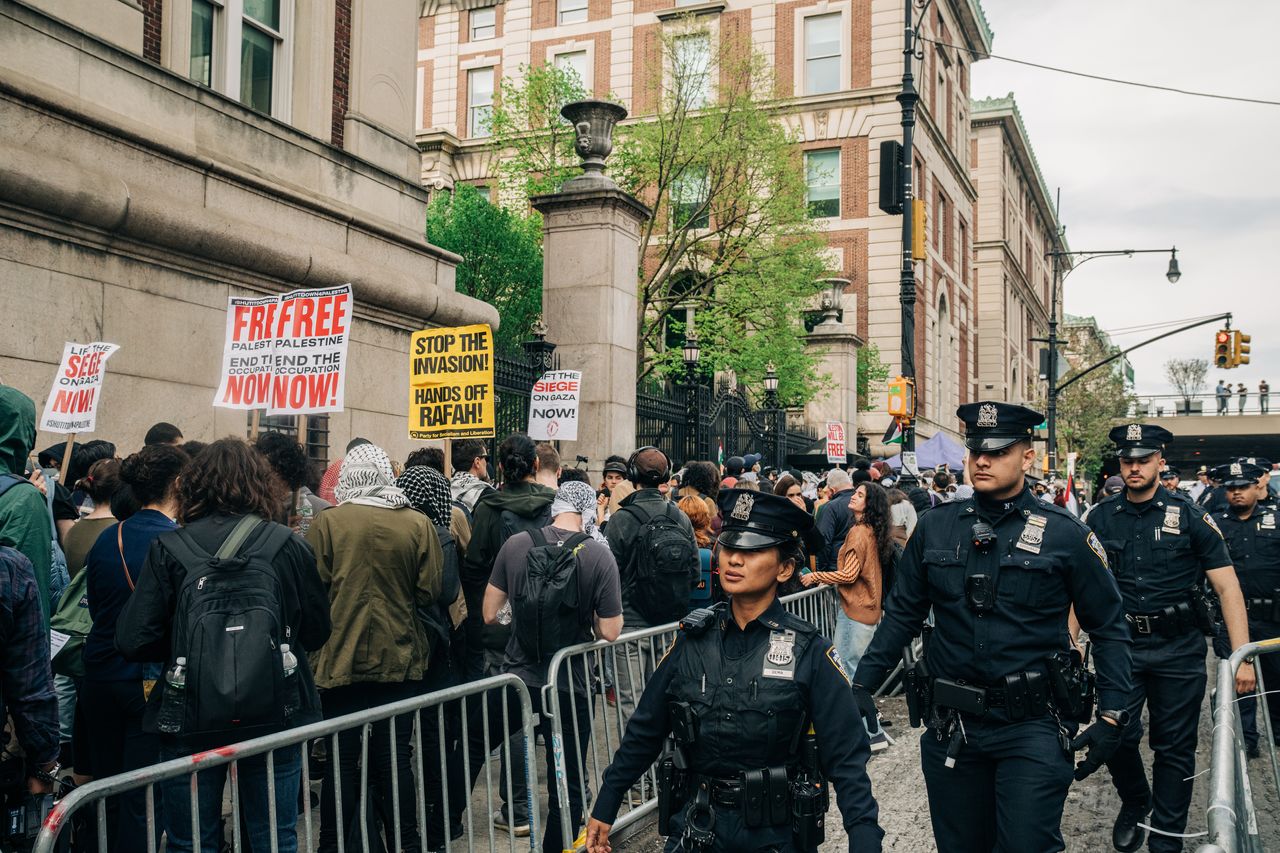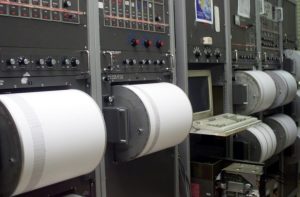NEW YORK―New York City Mayor Eric Adams said an increasingly tense standoff at Columbia University “must end now,” as police lined up on streets close to an academic building occupied by pro-Palestinian demonstrators.
“I’m urging every student and every protester to walk away from this situation now and continue your advocacy through other means,” Adams said at a press conference Tuesday evening. “We will always protect the right to protest, but we must balance that right with the right to keep students, the school and our city safe.”
Police entered Columbia University’s campus a few hours later, where they breached a building that had been occupied by protesters and removed pro-Palestinian demonstrators from encampments. City officials had repeatedly said police wouldn’t go onto the campus unless asked.
Columbia sent an alert to people on its main Morningside campus at around 8:20 p.m. ordering them to “Shelter in place for your safety due to heightened activity” and to “avoid the area until further notice.”
Police officials said individuals inside the building could be charged with burglary in the third degree, criminal mischief and trespassing, while those in encampments outdoors on campus grounds could be charged with trespassing and disorderly conduct.
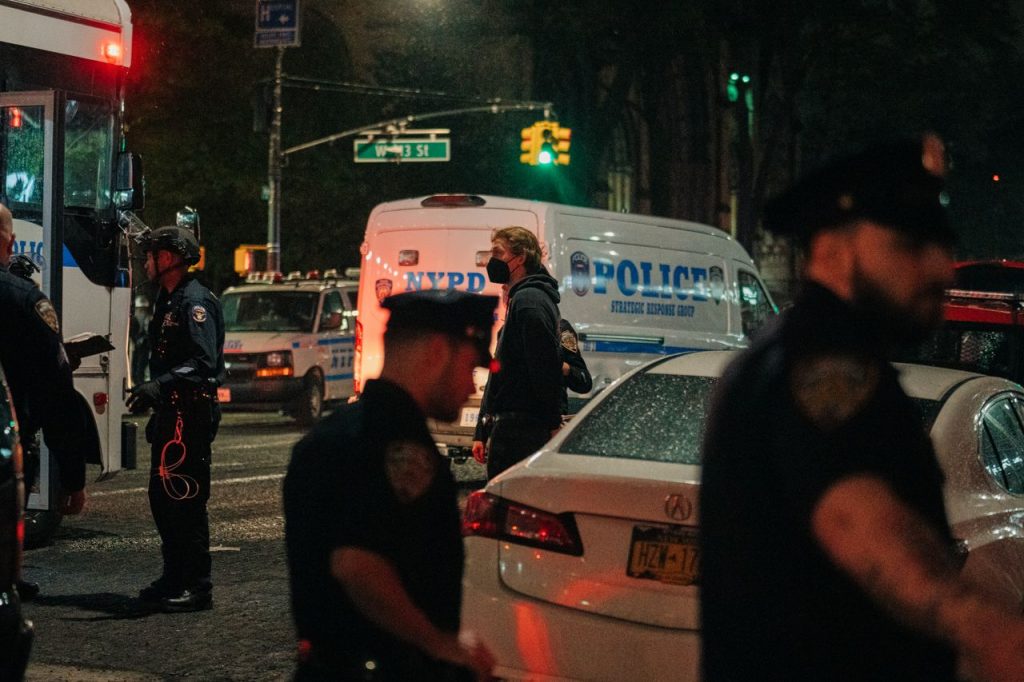
Student protesters are arrested and removed from the Columbia University campus Tuesday night. PHOTO: JEENAH MOON FOR THE WALL STREET JOURNAL
Officials also alleged that outsiders not affiliated with Columbia were among those occupying Hamilton Hall, and that these people played a role in the escalating tactics on campus. Hamilton Hall has a history of being occupied by student protesters, including during demonstrations related to the Vietnam War in 1968 and the South African apartheid in 1985.
Messages requesting comment from Columbia student protest groups weren’t returned.
Columbia officials earlier threatened to expel students involved in the takeover of Hamilton Hall as it sought to end a standoff between pro-Palestinian demonstrators and the Ivy League school.
“We’ve made it very clear that the university cannot be endlessly interrupted by protesters who violate the rules,” Ben Chang , a spokesman for Columbia, said late Tuesday afternoon. He said Columbia was “exploring options to restore safety and order to our campus.”
Student protesters occupied the building after a prolonged conflict with the New York City university over an on-campus encampment. Columbia said students who didn’t commit to the school’s request to leave the encampment by 2 p.m. Monday will be suspended; seniors will be ineligible to graduate.
The university restricted campus access to students who are residents there and essential employees.
Tuesday afternoon, a group of people, many masked, were gathered near an entrance to Hamilton Hall, where the dean of Columbia College has an office. Metal tables and chairs blocked the doors inside and out.
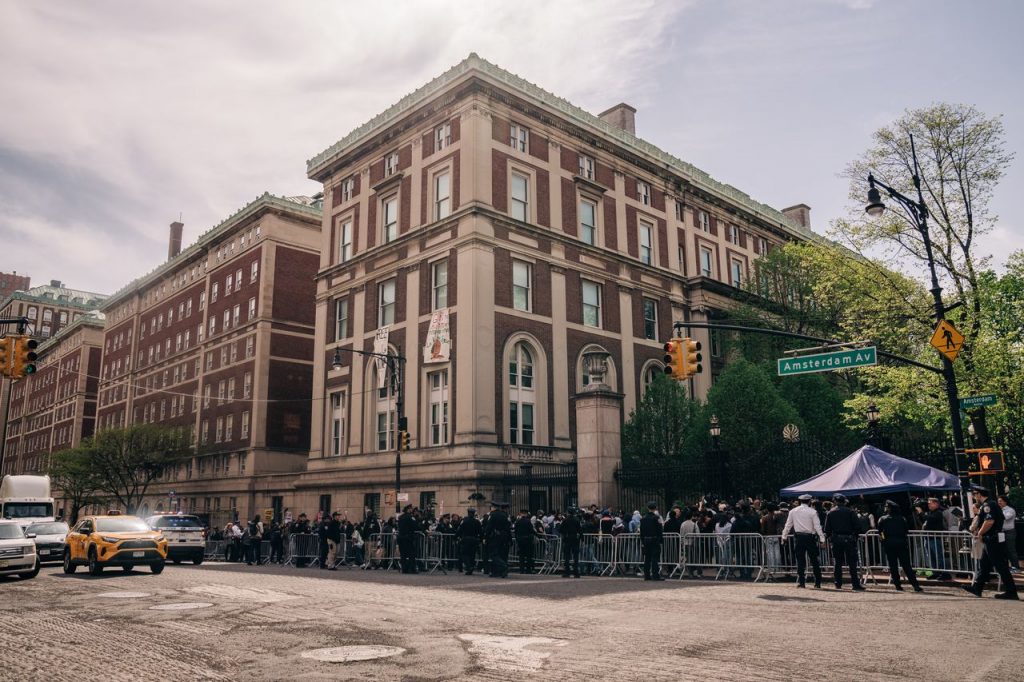
Police and demonstrators near Hamilton Hall on Tuesday. PHOTO: JEENAH MOON FOR THE WALL STREET JOURNAL
“The administration created a siege,” said a woman who addressed the small crowd outside the building. “They have closed us in on campus, they have locked us down…The administration is scared of students and frankly they should be.”
In an emailed statement, Columbia University Apartheid Divest warned university administrators against calling in the New York City Police Department.
“Do not incite another Kent or Jackson State by bringing soldiers and police officers with weapons to our campus,” the group said, referencing deadly shootings amid campus unrest at the universities in 1970. “Students’ blood will be on your hands.”
Protesters earlier said that unless Columbia met their demands, including for the university to divest itself of investments in companies doing business with Israel , they had no intention of disbanding.
The encampment spurred similar protests over the Israel-Hamas war at colleges across the country . School officials have struggled to balance free-speech rights with campus security. Many Jewish students have said they feel unsafe amid rising antisemitism. Protesters have said their demonstrations are peaceful.
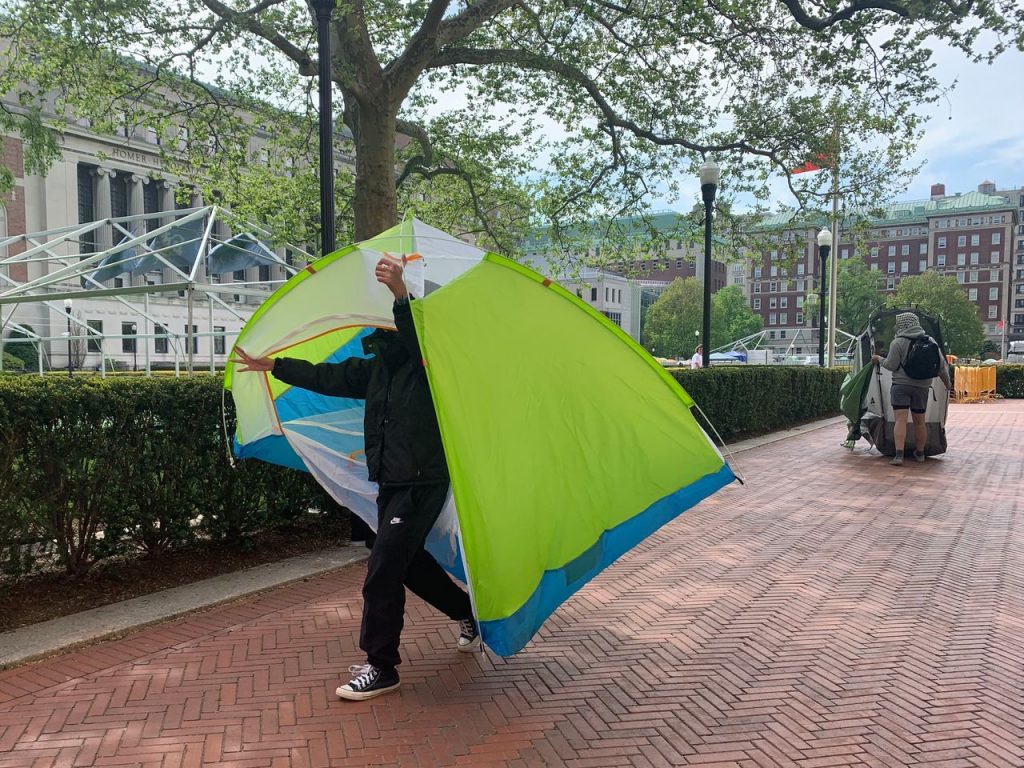
Protester moves a tent on Columbia University campus Tuesday. PHOTO: ERIN AILWORTH/THE WALL STREET JOURNAL
Protests and clashes have occurred this week at colleges across the country. Protesters were arrested and in some cases buildings were occupied at schools including Cal Poly Humboldt, the University of Connecticut, the University of Florida, the University of Georgia, Virginia Commonwealth University, and Princeton University, according to school and local officials. Pro-Palestinian protesters clashed with police at the University of North Carolina at Chapel Hill after an early morning raid Tuesday cleared an encampment, local news footage showed.
Some schools have de-escalated protests. Yale University said all protesters left their encampment Tuesday morning after the school threatened to suspend and arrest them. Northwestern University in Illinois said it came to an agreement with students to disband the encampment but leave one tent up until June 1. The school pledged to support Palestinian faculty and students and revive its advisory committee on investment responsibility.
Some Columbia students not involved in the protests said they have been frustrated by how the conflicts have disrupted their lives.
Sam Kaplan, a law student, said he just wanted to go to the gym and work out, but wasn’t allowed in because he lives off campus. The 24-year-old said he has found it difficult to stay focused and study since the protests began. “It’s been a toxic and loud environment on campus,” Kaplan said.
Throughout the day Tuesday, people sent supplies including water and pizzas into Hamilton Hall using a black milk crate and a rope to raise it up to some students on a ledge.
CUAD, the student group, said protesters had renamed the building Hind’s Hall, after Hind Rajab , a 6-year-old Gazan who was killed in Gaza City in January. They unfurled a banner from the building that said “intifada,” an Arabic word meaning “an uprising” that Jewish leaders say is an incitement to violence against Israelis and Jews. The suicide bombings and fighting of the Second Intifada in the early 2000s killed about 3,000 Palestinians and 1,000 Israelis.
A White House spokesman, Andrew Bates , said President Biden condemned the use of the term “intifada” and antisemitic smears.
“President Biden respects the right to free expression, but protests must be peaceful and lawful,” Bates said. “Forcibly taking over buildings is not peaceful—it is wrong. And hate speech and hate symbols have no place in America.”
House Republicans criticized the university for what they said was a failure to protect Jewish students.
“We will not allow antisemitism to thrive on campus and we will hold these universities accountable,” House Speaker Mike Johnson (R., La.) said Tuesday.
The occupation of Hamilton Hall began several hours after Columbia University started suspending students who stayed in the pro-Palestinian encampment past the 2 p.m. Monday deadline school officials had set for them to disperse voluntarily.
Video showed protesters carrying tables to barricade the hall’s entrance and linking arms to block a doorway. Many of them wore kaffiyehs, Arabic headdresses associated with the pro-Palestinian cause. Some of the glass panes of the door had been smashed.
Columbia President Minouche Shafik said Monday that the school wouldn’t divest its investments in Israel and reiterated that protesters needed to leave or face consequences.
Shafik has faced criticism from both sides over her handling of the protests. Some faculty and student groups have called for her to step down for limiting students’ and professors’ rights to free speech. Some Jewish students have accused her of not doing enough to end the protests.
Columbia has in recent days said Shafik was “focused on de-escalating the rancor on Columbia’s campus.”
Confrontations between supporters of Israel and those of Palestinians have been hard for universities to manage. The presidents of Harvard University and the University of Pennsylvania both stepped down under pressure over their handling of antisemitism on campus. Colleges have faced a backlash from alumni and donors about how they have handled the fallout from the Oct. 7 attacks in Israel.
Write to Erin Ailworth at erin.ailworth@wsj.com , Suryatapa Bhattacharya at Suryatapa.Bhattacharya@wsj.com and Jon Kamp at Jon.Kamp@wsj.com
